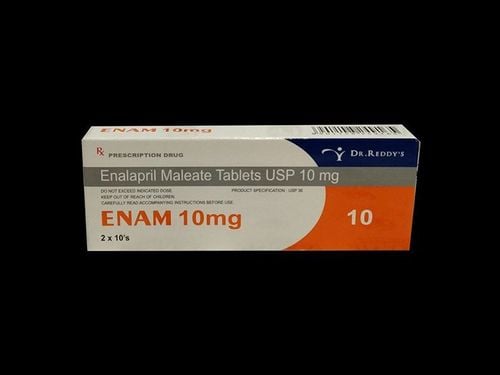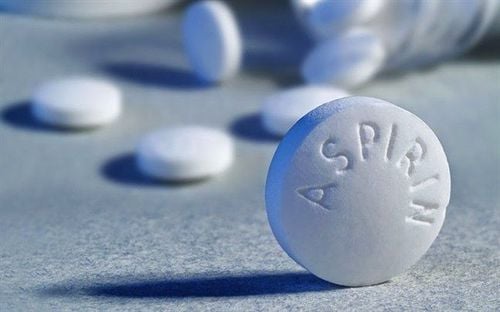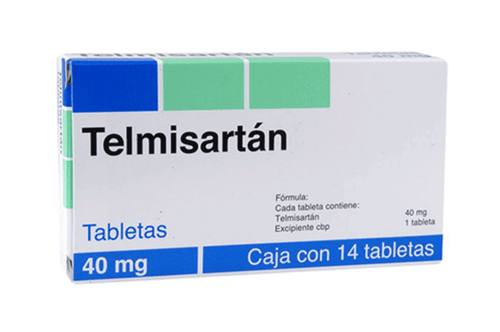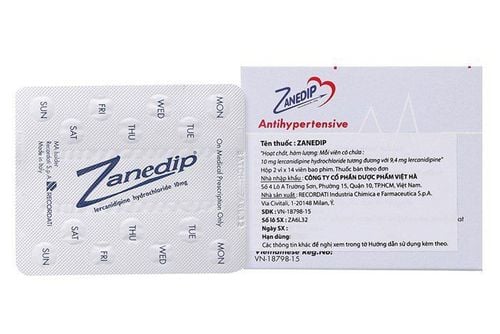This is an automatically translated article.
SP Enalapril is used in the treatment of cardiovascular diseases, available in most pharmacies nationwide. Patients should carefully read the instructions and consult a doctor before using the drug.
1. What is SP Enalapril?
SP Enalapril belongs to the group of cardiovascular drugs, which are prepared in the form of tablets and packed in boxes of 3 blisters x 10 tablets. Products of ShinPoong Daewoo Pharmaceutical Company Vietnam - VIETNAM.
SP Enalapril has the main ingredient Enalapril maleate 5mg and other excipients just enough for 1 tablet.
2. Indications for use of SP Enalapril
SP Enalapril is used in the following cases:
Treatment of mild to severe idiopathic hypertension. Treatment of hypertension due to kidney disease. Treatment of hypertension with diabetes. Treatment of heart failure levels such as: slowing the progression of heart failure, improving survival and reducing the number of myocardial infarctions. Treatment and support to prevent congestive heart failure. Support to prevent ventricular dilatation after myocardial infarction.
3. How to use SP Enalapril
SP Enalapril is in the form of tablets and is used orally. SP Enalapril can be taken before or after food, because food does not alter the bioavailability of the drug. You should take 1-2 doses per day.
Dosage of the drug will depend on the condition and progress of the disease in each person, the doctor will have the most appropriate dose adjustment.
Treatment of primary hypertension:
The starting dose of Enalapril is 5mg, the dose can be increased depending on the degree of hypertension, the maintenance dose of Enalapril is determined after 2-4 weeks of treatment. The daily dose is 10-40 mg of Enalapril, taken once a day or in two divided doses. Maximum dose of 40 mg Enalapril/day. Patients should start from the lowest dose of Enalapril, because of the potential for symptomatic hypotension. Care should be taken not to use at the same time as diuretics.
People with renal failure:
Creatinine clearance 30 - 80 ml/min, dose 5 - 10 mg Enalapril/day. Creatinine clearance 10-30 ml/min, dose 2.5-5 mg Enalapril/day. People with heart failure:
This case is often combined with digitalis + diuretics (should reduce diuretic dose and use interval before taking Enalapril).
The starting dose of 2.5 mg Enalapril, which can be gradually increased to a therapeutic dose, must be done under careful supervision from the treating physician or pharmacist.
4. Contraindications to use SP Enalapril
SP Enalapril should not be used in the following cases:
Patients with hypersensitivity to enalapril or to any of the excipients contained in the drug. Patients with aortic stenosis and renal artery stenosis. Hypotension preceded by severe obstructive cardiomyopathy.
5. SP Enalapril drug interactions
SP Enalapril when combined with some other drugs can occur drug interactions with each other, so it should not be used concomitantly with enalapril. In this case, the doctor may change the dose or take necessary measures.
If the patient is taking enalapril, it is important to inform the doctor or pharmacist of other medications he or she may be taking, especially the following:
Diuretics Potassium supplements Anti-inflammatory drugs Other blood pressure medications Lithium Tricyclic antidepressants Antipsychotics Anesthetics, narcotics Nonsteroidal anti-inflammatory drugs Sympathomimetics Diabetic drugs Acetylsalicylic acid Drugs Thrombolytics Blockers beta and alcohol.
6. Side effects of SP Enalapril
During the use of SP Enalapril, patients may experience some unwanted side effects such as:
Blood and lymphatic system disorders: Anemia, neutropenia, decreased hemoglobin, anemia aplasia and hemolytic anemia, decreased haematocrit, thrombocytopenia, granulocytopenia, autoimmune disease, bone marrow suppression, pancytopenia, lymphadenopathy. Nutritional disorders: hypoglycemia. Nervous system and mental disorders: Depression, headache, confusion, insomnia, somnolence, irritability, paresthesia, dizziness, sleep disturbance, abnormal dreams. Eye disorders: blurred vision. Cardiovascular disorders: Hypotension, orthostatic hypotension, dizziness, syncope, chest tightness, myocardial infarction, tachycardia, cerebrovascular accident, arrhythmia, angina pectoris, Raynaud's phenomenon, palpitations. Respiratory tract disorders: dyspnea, hoarseness, cough, rhinorrhea, pharyngitis, rhinitis, bronchospasm, asthma, pulmonary infiltrates, allergic alveolitis, eosinophilic pneumonia. Gastrointestinal disorders: nausea and vomiting, abdominal pain, diarrhea, constipation, taste changes, intestinal obstruction, pancreatitis, mouth sores, dyspepsia, loss of appetite, stomach irritation, dysphagia, ulcers stomach, aphthous, glomerulonephritis. Hepatobiliary disorders: jaundice + cholestasis, liver failure, hepatitis Subcutaneous tissue and skin disorders: Hypersensitivity reactions, rash, angioedema, pruritus, alopecia, urticaria, erythema multiforme , exfoliative eczema, Stevens-Johnson syndrome, toxic epidermolysis bullosa, pemphigoid erythema. Fever, vasculitis, serosa, myalgia, arthralgia, myositis, arthritis, ANA positive, oliguria, eosinophilia, leukocytosis, renal failure, proteinuria. Reproductive system: gynecomastia in men, impotence. Other disorders: fatigue, weakness, cramps, flushing, tinnitus, dizziness. Laboratory abnormalities: increased plasma creatinine, hyperkalemia, uremia, hypernatremia, increased plasma bilirubin, increased liver enzymes. Patients should inform their doctor or pharmacist about the adverse effects encountered while taking SP Enalapril.
7. Precautions when using SP Enalapril for treatment
Patients should carefully refer to the drug instruction leaflet listed on the product packaging or as directed on the prescription of a doctor or pharmacist. In addition, you can refer to some notes below.
In hypertensive patients receiving enalapril, symptomatic hypotension may occur if the patient is volume-depleted. Enalapril must be used with caution in patients with left ventricular septal defect, cardiogenic shock, and hemodynamic obstruction. In case of renal failure, the starting dose of Enalapril must be adjusted according to the creatinine clearance and the patient's response to treatment. Therefore, it is necessary to closely and regularly control creatinine and potassium. The risk of hypotension and renal failure is increased in patients with bilateral renal artery stenosis or narrowing of the artery to a functioning kidney. There have been cases of neutropenia/granulocytopenia, thrombocytopenia and anemia in patients taking ACE inhibitors. Enalapril should be used with caution in patients with collagen vascular disease treated with allopurinol or procainamide, immunosuppressive therapy, or a combination of these complicating factors. Angioedema of the face, lips, tongue, glottis and/or pharynx has been reported in patients treated with ACE inhibitors. Rare cases of anaphylaxis have been reported in patients receiving ACE inhibitors during desensitization with snake venom. Cases of anaphylaxis have been reported in patients on high-velocity membrane dialysis and concomitant treatment with ACE inhibitors. In patients with diabetes treated with insulin or oral antidiabetic agents, blood glucose levels should be closely monitored during the first month of ACE inhibitor therapy. There have been cases of dry cough while taking the SP Enalapril. There have been cases of hypotension during surgery or anesthesia in patients taking ACE inhibitors. There have been cases of hyperkalemia in patients taking ACE inhibitors. Co-administration of enalapril with lithium should not be combined. If the patient is intolerant to certain types of sugar, the drug should not be used. Do not take SP Enalapril during pregnancy. SP Enalaril passes into breast milk, however, there are no exact data on whether the drug affects the newborn, so it should not be used while breastfeeding. SP Enalapril can sometimes cause dizziness and fatigue, so caution should also be exercised when driving and operating machinery. SP Enalapril is used in the treatment of cardiovascular diseases such as heart failure, high blood pressure,... To ensure effective treatment and avoid unwanted side effects, patients need to strictly follow instructions. under the guidance of a specialist doctor or pharmacist.
Follow Vinmec International General Hospital website to get more health, nutrition and beauty information to protect the health of yourself and your loved ones in your family.
Please dial HOTLINE for more information or register for an appointment HERE. Download MyVinmec app to make appointments faster and to manage your bookings easily.













